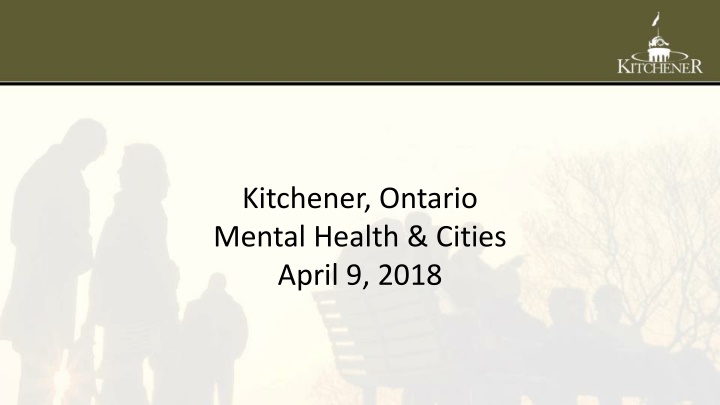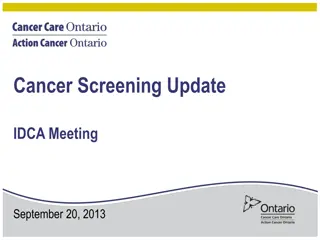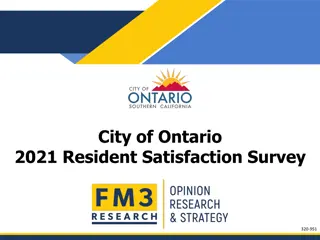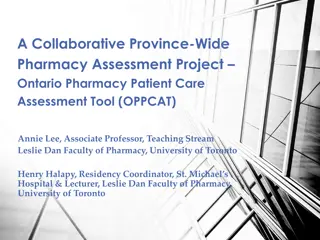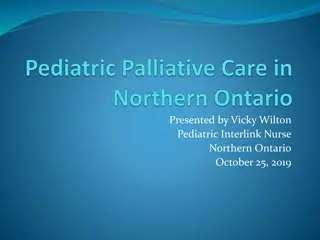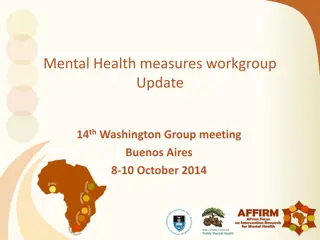Mental Health Challenges in Kitchener, Ontario: Key Insights and Concerns
Explore the significant issues surrounding mental health in Kitchener, Ontario, revealed through discussions with local stakeholders, including the impact on hospital visits, Indigenous health disparities, and the need for improved community support services. Key points emphasize the inadequacy of Emergency Departments for mental health care and the urgent requirement for well-resourced community supports to address the growing mental health crisis.
Download Presentation

Please find below an Image/Link to download the presentation.
The content on the website is provided AS IS for your information and personal use only. It may not be sold, licensed, or shared on other websites without obtaining consent from the author.If you encounter any issues during the download, it is possible that the publisher has removed the file from their server.
You are allowed to download the files provided on this website for personal or commercial use, subject to the condition that they are used lawfully. All files are the property of their respective owners.
The content on the website is provided AS IS for your information and personal use only. It may not be sold, licensed, or shared on other websites without obtaining consent from the author.
E N D
Presentation Transcript
Kitchener, Ontario Mental Health & Cities April 9, 2018
April 3, 2018 Discussion with various local stakeholders Waterloo Wellington Local Health Integration Network Grand River Hospital Waterloo Regional Police Service Region of Waterloo Housing and Public Health 3rdparty / Not-For-Profit service providers
Waterloo Wellington Local Health Integration Network (WWLHIN) 23% of residents with 4+ chronic conditions have mental health as one of their diagnosis When people can t get timely care in the community, they cycle in and out of hospital more often, as shown through repeat visits to the Emergency Department (within 30 days) For Mental Health Conditions: 13.5% for St. Mary s General Hospital and 16.9% for Grand River Hospital For Substance Abuse Conditions: 25.5% for St. Mary s General Hospital and 28.4% for Grand River Hospital
Waterloo Wellington Local Health Integration Network (WWLHIN) Waterloo-Wellington has approximately 20,000 residents who identify as Indigenous 15% of the homeless population in Waterloo Region are Indigenous people Waterloo-Wellington does not have an Aboriginal Health Access Centre or Aboriginal Community Health Centre, and receives no funding specifically for Indigenous health care Would funding skip a 20,000 person Indigenous reserve?
Grand River Hospital Mental Health Emergency Department Visits Mental Health Related Includes F* diagnoses as well as those typically associated with Mental Health and Addictions patients (intentional self harm, suicidal ideation, etc.) Source: Winrecs (NACRS)
WWLHIN and Grand River Hospital: Key Points People with Mental Health issues are increasingly going to Hospitals and the Emergency Department because there is no other appropriate place to go The Emergency Department is not the best place to handle mental health issues, and results in disproportionally higher repeat visits to the Emergency Department Well-resourced community supports are needed for mental health patients
Waterloo Regional Police Services 3,700 mental health calls per year (this does not include crime) Due to gentrification, additional 6,500 calls per year for unwanted persons unwanted person usually has mental health issues Total of over 10,000 calls per year for which there is a Police response in addition to taking the call, but is not necessarily a policing issue
Waterloo Regional Police Services Police have good support and training, but they are forced to do more than policing Police are not the experts when dealing with mental health issues, but understand they have to do it There are times when Police simply need to call Paramedics to assist, using up more resources
Waterloo Regional Crime Prevention Council Justice System Grand Valley Institution for Women (in Kitchener, federal prison) Mental health issues are prevalent 49% of federal inmates have learning disabilities Little to no supports in Waterloo Region after release from jail Kitchener and area doesn t have half-way homes People likely with mental health issues and learning disabilities are released from prison with very limited medications, no identification, no discharge planning, and no means of addressing any of those issues themselves The result is an increased likelihood of interfacing with the same inappropriate systems (police, prison, hospital, shelters) all over again
Waterloo Regional Crime Prevention Council Justice System Largest source of mental health housing is jail People show significant struggles, and it is being dealt with in the justice system (in addition to hospitals) The justice system is even less equipped to deal with mental health issues compared to hospitals i.e. 8 suicides at justice buildings People don t have supports, and don t know what to do
Seniors Mental health for seniors is an emerging issue Loneliness is the new smoking and obesity i.e. High suicide rate among single males over 75 years old since they have less or no social bonds This is likely to increase with an aging population
KW Counselling funding and reporting requirements $3M in funding = 162 annual funding reports Approx. $18,000 in funding per report Not-For-Profit organizations want to provide more services, but are using limited resources to write reports to prove they use limited resources well There is an elaborate system of accountability that takes away from service Organizations are not against transparency or accountability Organizations are against red tape that ties up staff time (could be providing a service to a person in need)
KW Counselling shrinking resources Not-For-Profit sector is not getting annual Cost of Living funding increase Can t find or retain staff i.e. had to post one position 4 times in 2017 1989 = $46K/yr salary (equivalent to $90K/yr in today s dollars) for a graduate with a few years experience Today = offering $53K/yr for a graduate with a few years experience This is not sustainable Results in cuts to services since costs increase but funding stays the same KW Counselling provides great service, but WWLHIN does not fund KW Counselling (not in their budget)
Innovative Local Solutions The Working Centre Created a medical clinic WWLHIN supports it via S.O.S. (Specialized Outreach Services) Clinic added an Registered Practical Nurse RPN is already overwhelmed with work in the clinic
Innovative Local Solutions Eby Village helps new people and long-time residents Bring people with complex issues On-site personal support Fosters and supports community integration Appropriate setting and appropriate supports
Innovative Local Solutions Region of Waterloo (ROW) Housing ROW Housing is not simply assisting clients to find suitable housing Increasingly apparent that mental health can be a significant factor in the sustainability of the tenancy ROW has partnered with the WWLHIN to have those supports paid through the Health Care system This best practice appears to be working
Innovative Local Solutions Region of Waterloo Social Assistance Increasingly, mental health has played a challenging role in locating and maintaining long term employment Clients are unable to maintain employment and require financial assistance much longer than intended by the design of the Ontario Works program ROW has formed a Counselling Collaborative with seven counselling agencies that provide supports Partially effective: In some cases, the counselling agencies move certain people from Ontario Works to the ODSP
Themes Being disconnected and isolated from society plays a big role in poor mental health i.e. homelessness, students in dorms, seniors living on their own, etc. Regular social contact/bonds are needed R.O.O.F. assists about 50-60 youth Being disconnected seems to start early
Themes Seems like we moved away from institutions, but did not provide community supports, which has left a gap Various Ministries, various sources of funding Many pockets of funding Complex and very frustrating Ministries don t seem coordinated Funding sources for mental health is the most complex of all healthcare funding Organizations piece together various sources of funding to get by A lot of little pieces come together, but not on a big scale to really move an issue significantly forward or make a significant and sustained impact
Recommendations Appreciate the recent $2.1 billion investment in mental health Almost need to create a new Ministry of Mental Health Coordinate funding, resources, support, etc. Liaise and coordinate with all stakeholders: WWLHIN, hospitals, justice system, jails, Not-For-Profit organizations, Social and Affordable housing, post-secondary institutions, Seniors, etc. A centralized structure that is sustainable, well-funded, and coordinated
Recommendations Crisis management gets some funding More Public Education and Prevention funding could create better outcomes for people and reduce overall costs to the system Need to get private sector more involved Parenting has been ignored in mental health Need good parenting program/education Parenting programs need funding support
Recommendations Innovation/recommendation Need to bring health care to where people are located Not just to set-up in hospital Bring mental health services to shelters, universities and colleges, homecare, etc. Community-building is needed People are left out People need things like social bonding The need for community is universal
